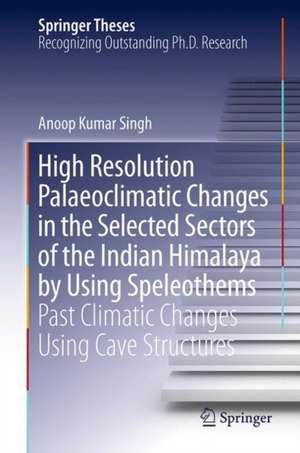High Resolution Palaeoclimatic Changes in Selected Sectors of the Indian Himalaya by Using Speleothems: Past Climatic Changes Using Cave Structures: Springer Theses
Autor Anoop Kumar Singhen Limba Engleză Hardback – 25 ian 2018
| Toate formatele și edițiile | Preț | Express |
|---|---|---|
| Paperback (1) | 634.00 lei 43-57 zile | |
| Springer International Publishing – 7 iun 2019 | 634.00 lei 43-57 zile | |
| Hardback (1) | 640.06 lei 43-57 zile | |
| Springer International Publishing – 25 ian 2018 | 640.06 lei 43-57 zile |
Din seria Springer Theses
- 18%
 Preț: 997.88 lei
Preț: 997.88 lei -
 Preț: 389.88 lei
Preț: 389.88 lei - 15%
 Preț: 646.94 lei
Preț: 646.94 lei - 18%
 Preț: 943.43 lei
Preț: 943.43 lei -
 Preț: 399.29 lei
Preț: 399.29 lei - 18%
 Preț: 944.99 lei
Preț: 944.99 lei - 15%
 Preț: 636.80 lei
Preț: 636.80 lei - 18%
 Preț: 941.05 lei
Preț: 941.05 lei - 15%
 Preț: 643.16 lei
Preț: 643.16 lei - 15%
 Preț: 642.68 lei
Preț: 642.68 lei - 18%
 Preț: 1103.62 lei
Preț: 1103.62 lei - 20%
 Preț: 558.83 lei
Preț: 558.83 lei - 18%
 Preț: 1112.30 lei
Preț: 1112.30 lei - 18%
 Preț: 944.19 lei
Preț: 944.19 lei - 18%
 Preț: 1109.92 lei
Preț: 1109.92 lei - 18%
 Preț: 1217.27 lei
Preț: 1217.27 lei - 15%
 Preț: 640.06 lei
Preț: 640.06 lei - 15%
 Preț: 636.45 lei
Preț: 636.45 lei - 15%
 Preț: 640.06 lei
Preț: 640.06 lei - 15%
 Preț: 640.88 lei
Preț: 640.88 lei -
 Preț: 389.70 lei
Preț: 389.70 lei - 20%
 Preț: 563.91 lei
Preț: 563.91 lei -
 Preț: 393.35 lei
Preț: 393.35 lei - 15%
 Preț: 637.93 lei
Preț: 637.93 lei - 15%
 Preț: 641.85 lei
Preț: 641.85 lei - 18%
 Preț: 1225.94 lei
Preț: 1225.94 lei - 20%
 Preț: 551.36 lei
Preț: 551.36 lei - 18%
 Preț: 1229.10 lei
Preț: 1229.10 lei - 15%
 Preț: 639.25 lei
Preț: 639.25 lei - 18%
 Preț: 999.45 lei
Preț: 999.45 lei - 15%
 Preț: 640.06 lei
Preț: 640.06 lei - 18%
 Preț: 1220.45 lei
Preț: 1220.45 lei - 18%
 Preț: 1116.26 lei
Preț: 1116.26 lei - 18%
 Preț: 1110.72 lei
Preț: 1110.72 lei - 18%
 Preț: 1000.87 lei
Preț: 1000.87 lei - 18%
 Preț: 891.17 lei
Preț: 891.17 lei - 15%
 Preț: 640.06 lei
Preț: 640.06 lei - 5%
 Preț: 1154.07 lei
Preț: 1154.07 lei - 15%
 Preț: 635.96 lei
Preț: 635.96 lei - 15%
 Preț: 640.88 lei
Preț: 640.88 lei -
 Preț: 387.20 lei
Preț: 387.20 lei - 18%
 Preț: 1109.92 lei
Preț: 1109.92 lei -
 Preț: 385.25 lei
Preț: 385.25 lei -
 Preț: 385.25 lei
Preț: 385.25 lei - 18%
 Preț: 1112.30 lei
Preț: 1112.30 lei - 18%
 Preț: 999.45 lei
Preț: 999.45 lei -
 Preț: 386.99 lei
Preț: 386.99 lei - 15%
 Preț: 637.13 lei
Preț: 637.13 lei - 20%
 Preț: 554.21 lei
Preț: 554.21 lei - 20%
 Preț: 555.59 lei
Preț: 555.59 lei
Preț: 640.06 lei
Preț vechi: 753.01 lei
-15% Nou
Puncte Express: 960
Preț estimativ în valută:
122.51€ • 133.12$ • 102.98£
122.51€ • 133.12$ • 102.98£
Carte tipărită la comandă
Livrare economică 21 aprilie-05 mai
Preluare comenzi: 021 569.72.76
Specificații
ISBN-13: 9783319735962
ISBN-10: 3319735969
Pagini: 128
Ilustrații: XV, 146 p. 56 illus., 46 illus. in color.
Dimensiuni: 155 x 235 mm
Greutate: 0.41 kg
Ediția:1st ed. 2018
Editura: Springer International Publishing
Colecția Springer
Seria Springer Theses
Locul publicării:Cham, Switzerland
ISBN-10: 3319735969
Pagini: 128
Ilustrații: XV, 146 p. 56 illus., 46 illus. in color.
Dimensiuni: 155 x 235 mm
Greutate: 0.41 kg
Ediția:1st ed. 2018
Editura: Springer International Publishing
Colecția Springer
Seria Springer Theses
Locul publicării:Cham, Switzerland
Cuprins
Introduction.- Speleothems and Climate.- Studied Speleothems and Methodology.- RESULTS.- Summary and Conclusion.
Notă biografică
Anoop Kumar Singh obtained M.Sc. and Ph.D. degrees in Geology from Kumaun University Nainital, Uttarakhand India. He has published nine research papers in peer-reviewed international journals and has earned over 15 impact points.
Textul de pe ultima copertă
This thesis encompasses a study of past precipitation patterns based on six cave stalagmites from different parts of the Indian Himalaya. This is the first speleothem study in the Indian Himalaya that shows a direct relationship between past precipitation and the collapse of civilization. The stalagmites examined were KL-3 from Jammu and Kashmir; TCS and BR-1 from Himachal Pradesh; and DH-1, SA-1 and CH-1 from Uttarakhand. Based on the high-resolution palaeoclimatic reconstruction (35 U/th dates, 5 AMS dates, 1,500 samples for δ18O and δ13C values) obtained for the duration of the Pleistocene–Holocene transition (16.2–9.5 ka BP) and Mid-Holocene–Present (ca. 4.0 ka BP–Present), three major events were identified, namely the Older Dryas (OD), Bølling–Allerød (BA) period and Younger Dryas (YD) at ca. 14.3–13.9, 13.9–12.7 and 12.7–12.2 ka BP, respectively. The study showed a gradual reduction in the precipitation from 4 ka BP onwards for about a millennium with a peak arid period between3.2 and 3.1 ka BP. According to the findings, the LIA (Little Ice Age) covers a time span from 1622–1820 AD, during which the climate was wetter than that in the post-LIA period (1820–1950 AD). In addition, this thesis supports the assumption that the WDs (Western Disturbances) contribute significantly to the total rainfall in the Himalaya region.
Caracteristici
Nominated as an outstanding PhD thesis by the Kumaun University Nainital, Uttarakhand, India Is the first speleothem study in the Indian Himalaya that shows a direct relationship between past precipitation and the collapse of civilization Provides raw data in the appendix
